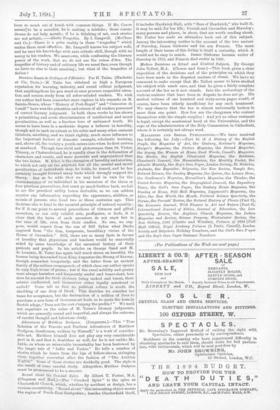Derniers Essais de Critique et d'Histoire. Par H. Taine. (Hachette
et Cie, Paris.)—M. Tains has obtained so high a European reputation for learning, industry, and sound critical judgment, that anything from his pen must at once procure respectful atten- tion and serious study from all sober-minded readers. We wish our author had been somewhat more copious in his remarks on M. Sainte-Beuve, whose " History of Port-Royal " and " Causeries de Lundi " have won the attention and esteem of all readers possessed of correct literary judgment. In both these works he has shown a painstaking and acute discrimination of intellectual and moral peculiarities, as well as a fearless love of unbiassed truth. He seems to have been in a moderate degree a believer in heredity, though not to such an extent as his critic and many other eminent thinkers, ascribing, and we think rightly, much more influence to the important factors of domestic example, scholastic training, and, above all, the society a youth enters into when he first arrives at manhood. Though less vivid and picturesque than St. Victor, Thierry, or Chateaubriand, he is equally clear in the delineation of characters and events, and more accurate and unprejudiced than the two latter. M. Ribot is the champion of heredity and atavism, to which not only all the physical, but all the mental and moral peculiarities of individuals may, he holds, be traced, and he has certainly brought forward many facts which strongly support his theory. But as he adds that we may look in vain for the characteristics of an individual in his ancestors of the three or four previous generations, but must go much further back, we fail to see the practical utility hence derivable, as we can seldom acquire any information regarding the appearance, abilities, or morals of persons who lived two or three centuries ago. This doctrine also is fatal to the vaunted principle of natural equality ; for if it can point to several generations of virtuous and gifted ancestors, or can only exhibit sots, profligates, or fools, it is clear that the heirs of such ancestors do not start fair in the race of life, even from their cradles. No one, we sup- pose, would expect from the son of Bill Sykes what Burke augured from "the firm, temperate, hereditary virtue of the House of Cavendish." Still, there are so many facts in favour of heredity that physicians and teachers would be materially aided by some knowledge of the ancestral history of their patients and pupils. In his articles on George Sand and M. de Lominie, M. TaMe has again laid much stress on heredity, the former being descended from King Augustus the Strong of Saxony, though somewhat irregularly, and the latter from an ancient family of the noblesse campagnarde, of which class our author speaks in very high terms of praise ; but if the rural nobility and gentry were always harmless and frequently useful and benevolent, how does he account for their chitin= being sacked and burnt, their estates confiscated, and themselves either legally murdered or exiled ? Some tell us that no political reform is worth the shedding of one drop of blood. This doctrine we consider too tame for acceptance, but the destruction of a million of lives to purchase a new form of Government leads us to quote the homely Scotch adage, " Does not the cost o'ergang the profits ? " We need not expatiate on the value of M. Taine's literary judgments, 'which are generally sound and impartial, and always the outcome of careful thought and laborious study.










































 Previous page
Previous page